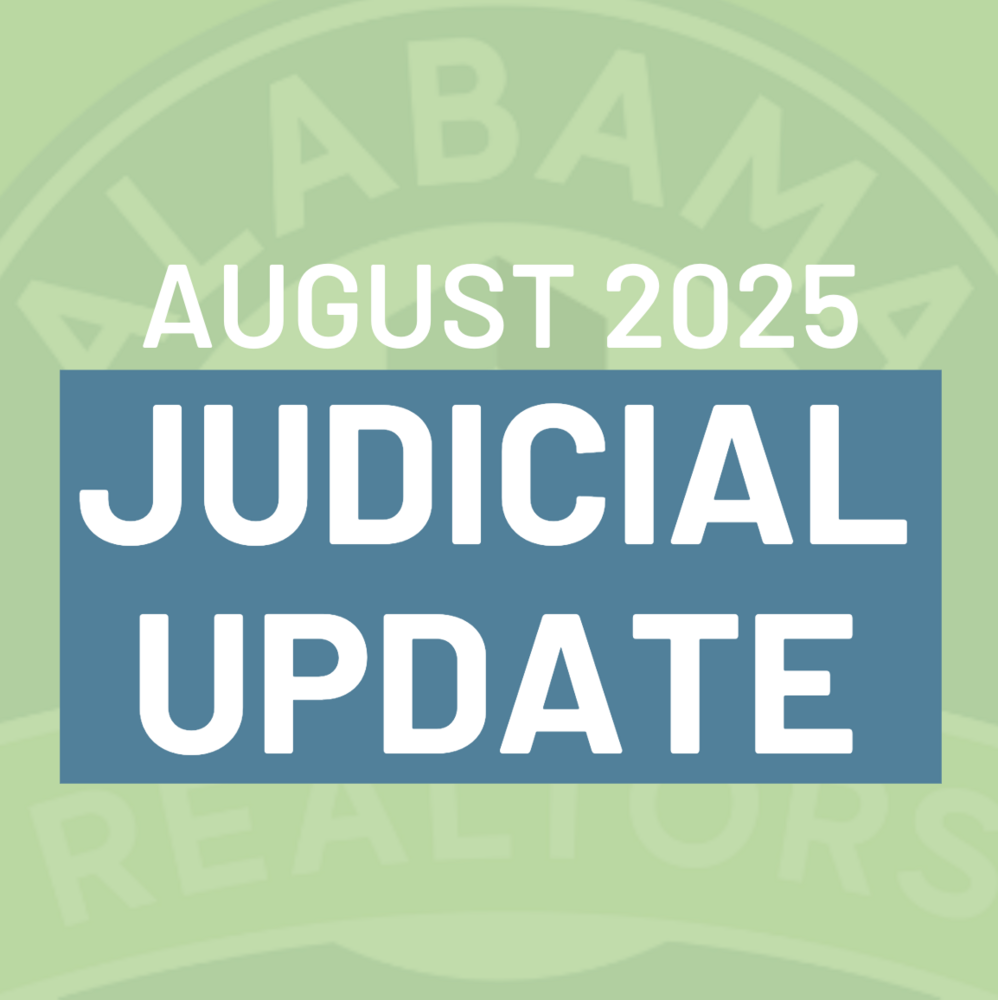
August 2025 Judicial Update
August 20, 2025
Our state and federal appellate courts stay busy hearing cases all year long. AAR’s Legal Team has compiled information about the cases that impact the real estate industry. Read on to learn more.
Alabama Court of Civil Appeals
Duty to Business Invitees
The Alabama Court of Civil Appeals recently considered a case related to the duties that a property owner owes to independent contractors that (s)he invites to the property. In Bone v Taylor (Ala. Civ. App. 2025), a homeowner discovered a leak in her shower and found that the leak was also impacting her basement. She contacted a plumbing company, who sent a technician to her home. While the technician was descending the stairs to the basement, he slipped, fell, and was injured. The technician later sued the homeowner.
In this case, the homeowner and technician had an invitor-invitee relationship. With this type of relationship, the invitor (owner) owner has a duty to keep the invitee (in this case, the technician) safe from hidden defects on the property. However, the property owner does not owe this duty when the invitee “knows as much or more than the premises owner does regarding a dangerous condition.” Taylor at 21, quoting South Alabama Brick Co. v Carwie, 214 So. 3d 1169, 1177 (Ala. 2016). The homeowner argued that since the technician was a plumber, he should have been aware of the dangerous condition of standing water, and therefore she did not owe him any duty. The Circuit Court agreed with her, but the Alabama Court of Civil Appeals did not. It found that the invitee must have knowledge of the specific dangerous condition – in this case, water with suds in the stairwell leading to the basement. The knowledge can come from the fact that the “danger is open and obvious to anyone,” from the owner telling the invitee everything the owner knows, or “because of the [invitee’s] expertise and previous experience on the premises.” Id. In this case, none of these options were the case. As such, the Court found the homeowner did owe a duty to the technician. The case was reversed and remanded to the Circuit Court.
Adverse Possession of Easements
The Alabama Court of Civil Appeals also heard a case related to easements. In Villarreal v Moss, Moss owned a landlocked property. To access the property, Moss also owned an easement across the property of her neighbor, Villarreal. Villarreal had a mobile home on his property and at some point, it was discovered that the mobile home was partially placed on the easement. A dispute about the existence and validity of the easement arose. Moss pointed to her deed, which included the easement she had described. Villarreal noted that his ownership documents did not discuss an easement and argued that even if Moss had an easement at some point, Villarreal had since obtained it through adverse possession. He based this on the fact that his mobile home had been sitting in the same place since 2000, more than 10 years before this dispute arose. The Circuit Court was not persuaded by this argument and ruled in Moss’ favor.
On appeal, the Court of Civil Appeals affirmed the Circuit Court’s judgement. The Court of Civil Appeals reviewed the elements of adverse possession. Villarreal was correct in asserting that his mobile home had been on the easement for a long enough time for adverse possession to apply. However, adverse possession, as its name suggests, requires an action adverse to the owner of the property to be possessed. Put another way, “the claimant’s conduct must afford an unequivocal indication that he is exercising dominion of a sole owner.” Strickland v Markos, 556 So. 2d 229, 235 (Ala. 1990). In this case, it’s true that Villarreal’s mobile home was placed on part of Moss’ easement. But the mobile home obstructed only 8 feet of a 24-foot-wide easement. Therefore, the easement was still useable for its intended purpose of accessing Moss’ property. As a result, an essential element of adverse possession was not met, and the Circuit Court’s judgment was affirmed.
Further Reading
The appellate courts have released several opinions lately that relate to real estate, but hinge upon legal procedural issues or other issues outside the scope of this article. These cases can be viewed at the following links: 790 Montclair, LLC v The Station at Crestline Heights, LLC, et al. (Ala. 2025); Hickey v State Farm Fire & Casualty Co. (11th Cir. 2025); Mizell v Wells Fargo et al. (11th Cir. 2025); CBS Holdings, LLC v Hexagon US Federal, Inc. (Ala. 2025); Ross v West Windo Condo. Assoc. (Ala Civ. App. 2025); and Hunter Bend Homeowners Association v Grimes (Ala. Civ. App. 2025).